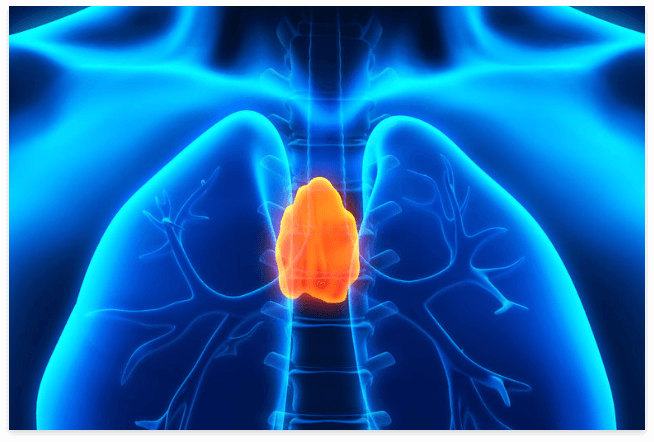Treatments
Thymus therapy

The thymus gland
The role of the immune system should be a central focus of any prophylaxis and medical treatment. If the body’s defences are strong, invading pathogens can be eliminated before they multiply, manifest a disease or become infectious. Should a disease break out, the self-healing power of a functioning immune system can influence its severity and hasten recovery.
The thymus – a small gland located just behind the sternum (breastbone) – plays a major role in building our immune system. At birth, the thymus gland is the third largest organ in the body, but during puberty it gradually shrinks and is largely replaced by connective and fatty tissue. In a 40-year-old adult, the thymus gland is already very small and hardly detectable any more.
The effect of the various thymus peptides has been proven in many studies. In the elderly and particularly in people with weakened immune systems, it is useful to compensate decreasing thymic activity to prevent degenerative diseases, malignancies, or autoimmune changes.
Thymus deficiencies can lead to a higher susceptibility to viral infections and fungal and bacterial diseases. Chemotherapy, radio therapy or antibiotic therapy can also cause thymic deficiencies. The thymus gland therefore plays an important role in our immune defence, and it is crucial for our overall health to strengthen it, both as a prophylactic and a therapeutic measure.

Signs of a weakened immune system include
Treatment and what it involves
Thymus therapy generally has a long-term effect. It is usually conducted over a period of four to six weeks, with an injection of thymus peptides being administered two to three times per week. These peptides are not fresh cell extracts, but peptides (proteins) taken from pig, sheep or calf organs. They are thoroughly filtered, tested, and then deep-frozen, virus-free, at minus 180°C. The thymus peptides are also tested for sterility and pyrogens as required by law.
Only organs and/or peptides with unremarkable findings are allowed to be processed or used.
The thymus agent is administered as an intramuscular injection in the abdomen or buttocks. It is important that the course of therapy is not interrupted. Under certain circumstances, it may be advisable to extend the treatment to eight weeks or to repeat it several weeks later.